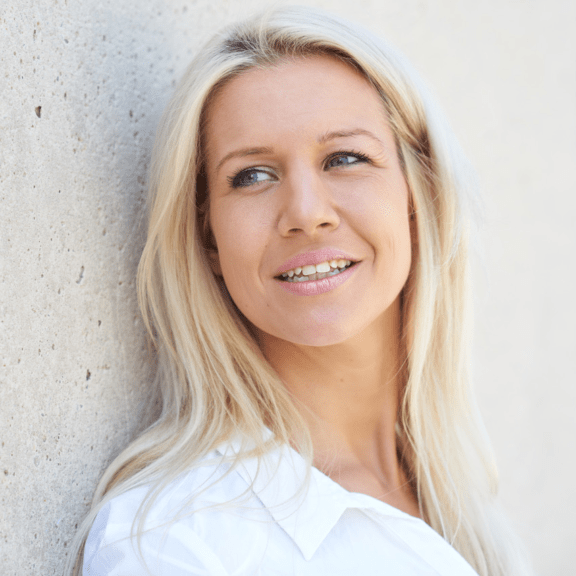TheBlood: Economies of scale or high scalability? #DHDL
Women's health is a huge market that is only just being de-tabooed and tapped. The start-up TheBlood, which appeared on "Die Höhle der Löwen", has also set out to push this further. But is their model really as "highly scalable" as they claim?
Wednesday,
27.09.2023

In the latest episode of “Die Höhle der Löwen”, the founders Miriam, Isabell and Lukas receive a lot of praise for their product, but also as a team and their business convinces almost all of the lions. This should hardly come as a surprise to those who know the scene, as they are active in the booming women’s health market with their product.
The Blood makes it possible for women to collect their menstrual blood at home with the help of a prepared kit and send it directly to a laboratory for analysis. Here, various makers such as vitamins are then evaluated and transferred to the associated app. Depending on the problem – PMS or period pain, for example – recommendations are then made. In its tests so far, for example, the team has found that about 90% of women have vitamin deficiencies, the compensation of which can mitigate the well-known premenstrual syndrome – the days before periods that are as famous as they are problematic.
Despite the often-cited crisis in the start-up world, such topics have been getting a lot of attention in recent years, from media and investors alike. The explanation for this is as simple as it is shocking: the topic of women’s health has been practically slept through until now, even the pharmaceutical companies, which are always portrayed as so greedy, could not imagine that millions of women would shell out good money for the relief of their monthly suffering – despite extensive and costly market research and ever new fancy methods such as focus groups or lead customers. It would be amusing if it weren’t so sad, this testimony to a collective failure.
But for such cases, we have start-ups that have also tackled this field properly in recent years. And investors who very soon understood that there was actually something to be gained here.
Like the lions, who are quick to prick up their ears, but this usually means that they also get to talk about the figures pretty quickly, and they make no exception for The Blood.
Nils Glagau rings in the numbers – at least in the edited version – and asks about the sales price. So the viewers find out that there are practically two variants: the one-time variant with a single kit for 42 euros and the subscription variant, in which four kits within a year cost 150 euros.
Now, of course, the lions want to know how much of that money actually “sticks” with the start-up, i.e. how much money can be earned with such a kit. Unfortunately, the founders have to admit that the lab currently receives around 30 euros for the test costs, but they emphasise that these will go down significantly with more tests, so that the margin could then be around 60%. From this they conclude – subject to possible factual gaps in the average – that their business model has a “very high scalability”.
But what does that actually mean, and can it be derived so directly from the one factor of a single declining cost type?
Normally, one speaks of a highly scalable business model when it is easy to produce large quantities quickly and, above all, when exponentially increasing sales entail costs that increase at most linearly. Simply put, if sales explode, costs do not explode with them, even though they naturally rise as well. An important factor here is usually the personnel costs: if, for example, I can produce and sell 1000 products a month with a team of 20 people, I don’t need 200 people for 10,000 products, but perhaps only 40. The turnover therefore grows by a factor of 10, while my personnel input only grows by a factor of 2. With 100,000 products, however, I might not even need 80 people, but even manage with 60. So this can only work if as few staff as possible are involved in direct production or sales.
But we don’t learn too much about that at The Blood. The founder is mainly interested in the fact that the costs per laboratory test are falling, which means that an essential component of the production costs is falling with larger quantities and thus the margin is increasing considerably. This is called a scale effect, but it has little to do with a scalable business model. After all, in this case, manual work – the evaluation in the laboratory – is part of the individual product, which usually has a rather negative effect on scalability. Because if the start-up grows strongly, individual laboratories could quickly reach their limits, so you have to bring in more or set up some yourself. These structures always take a little time, you can’t just press a button to double capacities, which is a classic hurdle in scaling – though not an insurmountable one. In addition, it’s important to mention that the cost per lab evaluation may go down, but it’s still substantial – that is, it’s a variable cost that’s always per unit.
However, since the market is probably huge and the laboratory infrastructure in Germany and neighbouring countries is probably not exactly bad either, investors would probably assess the feasibility rather positively, but would certainly have different opinions as to whether such a model really passes for “highly scalable”.
But scalable with good margins is sufficient in most cases – especially with a sufficiently large market and efficient ways of acquiring customers, about which we unfortunately do not learn much.
But the topic alone and the capable founding team certainly deserve to prove its scalability on the market, and the commitment of the lions Nils Glagau and Carsten Maschmeyer shows that they probably see it similarly. Even if the deal – apparently from the founders’ side – did not go through, we can be curious to see how many more such exciting start-ups this market segment will produce in the future. Hopefully they will scale as strongly as possible and finally help so many women who have been virtually ignored by medicine and pharmaceuticals for so many years.
Photo (above): TVNOW / Bernd-Michael Maurer

Ruth Cremer
Ruth Cremer is a mathematician and consultant as well as a university lecturer in the field of business models, key figures and financial planning. As a former investment manager, she knows what investors look for and also helps with pitch and document preparation in the investment or acquisition process. Since 2017, she is involved as an external consultant in the selection and preparation of the candidates in "Die Höhle der Löwen".
